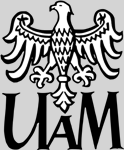Sławomir Sikora - Research
From Department of Applied Logic
| Revision as of 19:59, 29 June 2007 (edit) Sikora (Talk | contribs) (New page: My research interests comprise a widely understood theory of language acts. In my approach to philosophical and logical issues concerning natural languages I follow Bacon's, Humboldt's and...) ← Previous diff |
Current revision (19:59, 29 June 2007) (edit) (undo) Sikora (Talk | contribs) (New page: My research interests comprise a widely understood theory of language acts. In my approach to philosophical and logical issues concerning natural languages I follow Bacon's, Humboldt's and...) |
Current revision
My research interests comprise a widely understood theory of language acts. In my approach to philosophical and logical issues concerning natural languages I follow Bacon's, Humboldt's and Wittgenstein's assumption which states that no signs are possible if they are not thought of. This means that if there are no signs referring to an event, it is impossible to think about that event. Therefore - not as a philosophical assumption but as a logical ramification - every acceptance of a belief about something entails a verbalized thought. Hence the dispute about the linguistic limits of the world is still valid, as a continuation of communicative acts referring to instrumental acts. Here I am planning to make use of Hintikka's epistemic logic and Ramsey's theory of beliefs.
I am also deeply interested in the issues of realism and relativism in categorization of notions in Western and Chinese logic (works of W. Quine, J. Chmielewski, Cheng Chung-ying, A. Graham, C. Hansen, C. Harbsmeier). It is possible that the findings of the listed authors and an analysis of the findings of contemporary cognitive and contrastive linguists might offer an answer to the question why calculus ratiocinator has established itself as a standard in Western scientific theory of cognition.



